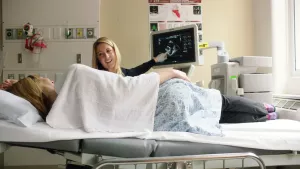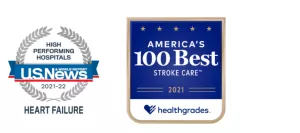Hypertrophic cardiomyopathy (HCM) is a genetic condition where the heart muscle becomes too thick. When the thickened muscle partially or completely blocks blood flow from the heart, it’s known as obstructive HCM. If the thickened muscle doesn’t obstruct blood flow, the condition is called nonobstructive HCM.
Helping get your heart back on beat
HCM is a relatively common genetic disease that affects your heart muscle. In fact, 1 in every 500 people have this condition. That’s 750,000 Americans — or more than Boston’s entire population.
HCM can affect people of all ages, cultures, races, ethnic groups and genders. Typically, HCM develops during puberty, but symptoms can start and worsen at any age. For most people, HCM symptoms arise in the middle of life.
At Tufts Medicine, we have the expertise and compassion to treat anyone with this condition, no matter what form it takes. Our expert care team features people from all backgrounds and cardiovascular specialties. We’ll work with you to create a personalized care plan that meets your individual needs and lifestyle.

Conditions
HCM causes hypertrophy, or excessive muscle thickening, of your heart muscle. This can make it challenging for the heart to pump blood to the rest of the body.
HCM most commonly affects the septum, a muscular wall separating the left and right ventricles of your heart. The type of HCM you have — obstructive or nonobstructive — depends on whether the thickened muscle interrupts a healthy blood flow from your heart.
Because HCM can affect your heart’s blood flow, it can be linked to other heart conditions like atrial fibrillation, heart failure and stroke.
HCM symptoms
Many people with HCM never experience serious problems or symptoms. That’s because the severity of the disease, symptoms and complications affect people in different ways. When people do have symptoms, they may experience the following:
- Arrhythmia (irregular heartbeats)
- Chest pain or pressure
- Fatigue and excessive tiredness
- Lightheadedness, dizziness or fainting
- Loss of consciousness
- Palpitations (sudden, forceful heartbeats)
- Shortness of breath
Obstructive HCM
About 2 out of 3 people living with HCM have this form of the disease. With obstructive HCM, blood flow from the heart gets partially obstructed or blocked.
This is caused by the heart’s mitral valve touching the thickened septum. It’s like riding a bicycle with misaligned brakes — you peddle, and the wheel moves, but when 1 side of the brake touches the wheel (or the mitral valve touching the thickened septum in this case), you slow down or even come to a stop.
For some people, this blood flow obstruction only happens during exercise, while for others, it also happens at rest. When the blood flow is obstructed, it increases the pressure in your heart and causes an array of symptoms.
Nonobstructive HCM
About 1 in 3 people living with HCM have the nonobstructive form of the disease. They still have thickened heart muscle, but there’s nothing that limits or blocks the blood flowing from their heart.
However, there are instances where a small fraction of people will experience severe symptoms that aren’t fully manageable with medications. This is often caused by a large buildup of scarring on the heart over time, which can lead to heart failure.
Atrial fibrillation (AFib) in HCM
About 1 in 5 people with HCM are affected by an irregular and oftentimes rapid heartbeat known as atrial fibrillation (AFib).
AFib in HCM can impact your health in 2 main ways:
- Frequent episodes of AFib can impact your quality of life.
- Your risk of stroke increases because blood clots can form and travel to the brain.
There are several approaches for treating AFib in HCM, including the use of antiarrhythmic drugs as well as a minimally invasive procedure known as a catheter ablation. One of the most impactful ways to completely prevent the risk of strokes is by prescribing anticoagulant medications.
Testing
Though HCM is a genetic condition inherited at birth, people often don’t know they have it until they experience symptoms later in life. That’s why we recommend staying up-to-date on your physical exams so that we may catch the disease earlier and reduce your risks of severe symptoms.
In addition to a comprehensive physical exam, we use the following tests to confirm your HCM diagnosis:
Imaging tests like an MRI and echocardiogram create a detailed picture of your heart. This helps us see any thickening of your cardiac muscle, which is caused by HCM.
Meanwhile, tests like the EKG and stress echocardiogram help us check the functionality of your heart, like if blood is flowing properly to the rest of your body.
Family screening for HCM + genetic testing
There are several gene mutations linked to HCM, and genetic testing can reveal if you’re living with any of them. People with HCM have a 50% chance of passing the condition to their children. That’s why we recommend family screening for HCM to identify any affected relatives, even if they may not have symptoms.
The screening process involves several cardiovascular imaging tests, a full clinical evaluation and the option to pursue genetic testing. We test for any gene mutations with a simple blood test.
It’s important to know that only 30% of people living with HCM will test positive for known mutations. That’s because scientists and researchers are still trying to identify all of the mutations that are responsible for HCM.
Treatments
HCM is very treatable, and the majority of people won’t require major interventions like surgery. In the event that you need a more advanced procedure, we’ll be here to answer any questions and support you every step of the way.
Monitoring
An ambulatory ECG monitor is a small, wearable device that records your heart rhythm during normal day-to-day activities. It can be worn for various lengths of time ranging from 24 hours to several weeks.
We’ll use it to detect any abnormal rhythms of the upper and lower chambers of your heart and see if they align with any HCM symptoms, like dizziness, a fast heartbeat or loss of consciousness.
Medications
Many people with HCM successfully control their symptoms for years or even decades with medication alone. Some of our most commonly prescribed HCM medications include:
- Anticoagulants (blood thinners): These help manage arrhythmia and atrial fibrillation.
- Antiarrhythmic drugs: These also help manage arrhythmia and atrial fibrillation.
- Beta blockers: These help control additional symptoms.
- Calcium channel blockers: These help control symptoms.
- Disopyramide: These help control obstructive HCM symptoms.
Heart failure with obstructive HCM is permanently reversible with medications like beta-blockers, verapamil and disopyramide.
Minimally invasive procedures
When medications aren't helping your symptoms, we can explore minimally invasive procedures, like an alcohol septal ablation or catheter ablation for recurrent AFib, to treat HCM. We also may recommend minimally invasive procedures for older adults.
Alcohol septal ablation
An alcohol septal ablation is a minimally invasive procedure that helps alleviate symptoms and regulate blood flow by reducing the thickness of your ventricular septum. It’s a smart alternative to open heart surgery because it leads to many of the same benefits with fewer risks and complications.
Alcohol septal ablations are oftentimes recommended for older people whose HCM symptoms don’t improve with medications.
For this procedure, we’ll place a flexible tube called a catheter into the femoral artery in your leg and then guide it up to the septal artery in your heart. When the catheter is in position, we’ll inflate a tiny balloon at the tip of the catheter. This lets us temporarily block your blood flow so we can release a small amount of alcohol into your septal artery.
The alcohol will reach the muscular walls in your septum and help reduce their thickness. It’ll take a couple of weeks for this procedure to have a full effect on your heart and blood flow.
Alcohol septal ablation is a surgical procedure to help with blood flow.
Catheter ablation for recurrent atrial fibrillation (AFib)
A catheter ablation for AFib is performed to reset your heart’s rhythm. This catheter-based treatment falls under the interventional cardiology medical specialty, where doctors can treat complex heart conditions using only a small incision.
A catheter ablation takes about 3–4 hours to complete, and you’ll be under general anesthesia. The procedure involves creating tiny scars on your heart that ultimately build tissue to help maintain a healthy heartbeat. The catheters can apply 2 different kinds of energy to create the scars:
- Cryo (freezing energy)
- Radiofrequency (heat energy)
After the procedure, most people return to their normal activities in a few weeks.
Potential interventions
While most people living with HCM won't require major surgery to get their condition under control, for those who do, our goal is to help restore healthy heart function.
If you’re living with nonobstructive HCM and experiencing severe symptoms, we’ll first recommend treatment with medications. If these don’t work, we might recommend a heart transplant. The good news is that survival with a heart transplant is exceptional, with an estimated 90% survival at 5–10 years.
A heart transplant involves surgically replacing a failed heart with a healthy one. It’s a serious procedure that often involves time spent on a waitlist and a long recovery time. Hearing that you need a heart transplant is never easy, but we have resources and support available to help you process the news and stay strong.
A small handful of people with HCM are at increased risk for life-threatening arrhythmias. We can get ahead of this risk by inserting a device called an ICD into the chest. To prevent sudden cardiac arrest, the ICD delivers electrical pulses to the heart to return it to a healthy rhythm.
In turn, this device can help you get back in the swing of things you love to do, for as long as you love doing them.
A septal myectomy is a type of open heart surgery that allows us to clear the obstruction in your heart, create a healthy blood flow from your heart to the rest of your body and ultimately alleviate your HCM symptoms.
During a septal myectomy, the doctor makes a small incision in the aorta to remove a small amount of muscle from the top of your septum wall. By removing some of this extra muscle, we can help restore your heart’s healthy function.
The average hospital stay for this procedure is 5 days, and recovery will take for several weeks.
Septal myectomy. Surgical procedure.
Awards + accreditations


From regular office visits to inpatient stays, find the healthcare you need and deserve close to home.

Meet the doctors and care team devoted to supporting you every step of the way along your path to better health.